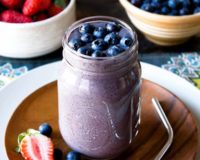Hay Fever Relief
Springtime is here and with it comes pollen season, which is bad news for hay fever sufferers. Hay fever, also known as allergic rhinitis, is typically a reaction to pollen from trees, grasses and weeds that makes the immune system believe pollen is a harmful invader, triggering production of the antibody immunoglobulin E. This stimulates release of histamine, causing inflammation and swelling of the nasal passages, along with excessive mucus production and other symptoms such as sneezing, itching nose and throat, watery eyes and a clear, runny nose.
However, before you reach for anti-histamine medications this spring, there are a number of foods, nutrients and herbs that are extremely beneficial for alleviating hay fever symptoms.
1. Kiwifruit
Kiwifruit contain more vitamin C, gram for gram, than oranges (especially the yellow kiwifruit variety). Vitamin C is an effective natural anti-histamine and anti-inflammatory, and it also supports healthy immune function and protects from secondary respiratory conditions. This can be very beneficial in achieving hay fever relief naturally.
2. Pineapple
Pineapple is a rich source of bromelain, an enzyme with strong systemic anti-inflammatory effects, which helps decrease common hay fever symptoms such as mucosal inflammation and nasal congestion.
3. Turmeric
Commonly used in Middle Eastern and Asian cuisine, this spice contains curcumin, a phytochemical with powerful antioxidant and anti-inflammatory actions that are comparable to steroidal and nonsteroidal drugs. Curcumin has been found to have anti-allergy properties, which inhibit the release of histamine. This has proven to be effective when treating allergic rhinitis naturally.
4. Onion
Having an onion a day can help keep your hay fever at bay. Everyone who’s chopped onions has probably experienced the fact that onions can make you cry. As a result, cooking with fresh onions can naturally help with opening and draining your sinuses. Additionally, onions contain quercetin, a chemical compound that has antihistamine properties and aid in the reduction of inflammation and nasal congestion.
5. Ginger
Make yourself a fresh veggie juice with a good slice of fresh ginger. Ginger is a powerful natural anti-inflammatory that helps reduce nasal swelling and associated hay fever symptoms. In fact, research from a 2008 study published in International Immunopharmacology suggests that ginger can modulate the immune response to inflammation associated with allergic asthma.
Lastly, Avoid Certain Foods
Limit or avoid cow’s milk and other dairy products as they can increase the production of mucus in the respiratory tract and exacerbate hay fever nasal congestion. Try alternatives such as rice, almond, quinoa and coconut milks.
Article by Lisa Guy










